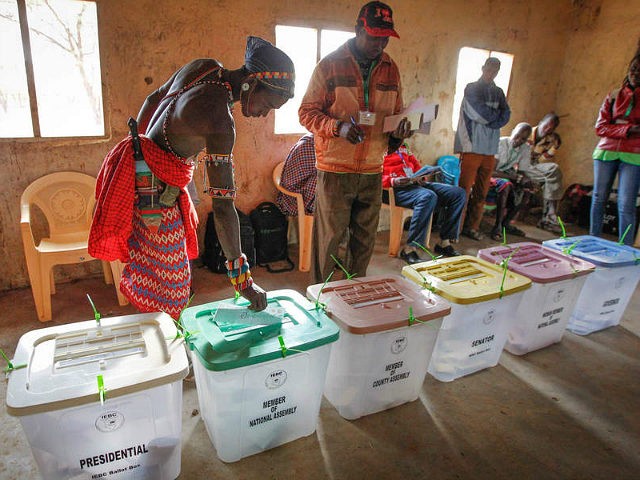The contentious Kenyan presidential election appears to have returned President Uhuru Kenyatta to office with a ten- or eleven-point win over his main rival, Raila Odinga. However, Odinga claimed Wednesday that the official results are “fictitious” and a fair count of the votes would show him as the winner.
Kenyatta, who was first elected in 2013, would begin a second term if the election results hold. He needed at least 50 percent of the vote to avoid a runoff election with Odinga and got 55 percent, according to the latest official tally.
“People started queuing early to ensure they could cast their vote. Long queues could be seen, and video footage at one polling station showed people injured after an apparent stampede,” the BBC reports.
“There was also the failure of some voter-identification equipment and one in four polling stations were apparently without mobile phone coverage meaning that officials would have to drive to the nearest town to send results,” the BBC adds.
One woman reportedly gave birth while waiting in line to vote and named her baby girl “Kura,” which is the Swahili word for “ballot.”
Odinga claims the electoral mischief goes far beyond a few suspicious equipment failures. As Sky News summarizes, he says hackers perpetrated an “attack on our democracy” by stealing the identity of an election official named Chris Msando, who was severely tortured and strangled to death last week along with a female companion. International observers, including the United States and the United Kingdom, expressed “grave concern” over Msando’s murder and what it might portend for the election.
According to Odinga, Msando’s pilfered password was used to hack into the election database and “create errors,” including a large number of fraudulent votes. Odinga further claims he has proof that over a million votes were improperly logged without the proper supporting documentation.
“This is why Chris Msando was assassinated, so that this could happen,” he charged. “You can only cheat the people so long. The 2017 general election was a fraud.”
The Associated Press reports that violent riots erupted on Wednesday after Odinga leveled his allegations, despite his calls for the public to remain calm. At least two people were said to have been shot dead in Nairobi, one of them witnessed by an AP photographer. Streets have been blocked, and protesters have scuffled with police, who responded with tear gas in some areas.
Some 1,200 people were killed in riots after he claimed the 2007 election was stolen from him, in part because of tribal resentments that simmer to this day. Kenyatta is the son of Kenya’s first president and a member of the Kikuyu tribe, while Odinga is from the Luo tribe, the second largest in the country.
“These results are not coming from out of the blue, but by fact and you cannot claim that results are fake with respect to presidential and you welcome the areas where your governors and your members of parliament have won convincingly. You have to accept the results however they come,” said an official from Kenyatta’s Jubilee Party, seeking to dismiss Odinga’s allegations.
The Kenyan election commission flatly denied opposition claims that the voting system was hacked. Regarding Msando’s murder, the commission insisted that no passwords were distributed to officials until just before the election, so Msando had no useful password to steal.
The Financial Times posits that some of the unrest is due to the firm conviction of both Kenyatta and Odinga supporters that their man could not possibly lose if the election was fair.
Kenyatta supporters point to solid economic growth during his term, including massive infrastructure projects like a $4 billion railway financed by China. Odinga supporters are equally convinced that Kenyans, especially younger voters, are hungry for political change. High food costs, persistently high unemployment, and corruption were among Odinga’s top issues.
At the very least, there seems to be a great deal of disagreement about what the election laws required in terms of voting procedures and documentation. The performance of the electronic voting system was said to be much better than in 2013, with only a 5 percent equipment failure rate compared to almost 50 percent four years ago.

COMMENTS
Please let us know if you're having issues with commenting.